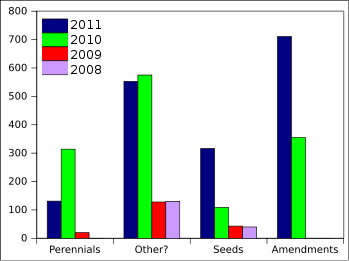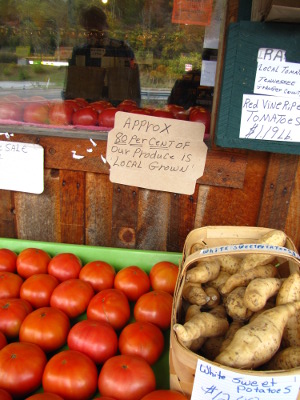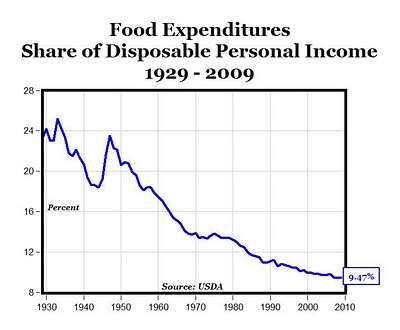
What is the real value of good food?
 I've
been enjoying the thought-provoking discussion in the comments section
of my Harvest
Table review.
Specifically, Lisa's question got me thinking about how much time and
money we put into our vegetable garden.
I've
been enjoying the thought-provoking discussion in the comments section
of my Harvest
Table review.
Specifically, Lisa's question got me thinking about how much time and
money we put into our vegetable garden.The chart to the left shows our garden expenditures for the last four years. The reason I went so far back in time is because I tend to spend a lot more money on the garden when I have the cash since I think of items like straw, cover crop seeds, and fruit trees as an investment in our farm's future health. But I don't want anyone to think you have to set aside $1,000 per year to grow your own vegetables. When we were pinching pennies in 2008 and 2009, we spent less than $200 annually and still managed to grow a lot of food, even if we didn't build our soil and increase our long term capacity with perennials.
 How about time? I
estimate we put in about 540 hours over the
course of the year working in the garden. That's where the real
"money" comes in, depending on whether we want to give ourselves
minimum wage ($3,915) or the amount I make on ebooks (about $25/hour,
which would make our garden time worth $13,500.) To be honest,
though, most farmers don't even make minimum wage, so they probably
would consider my time worth more like $2,000. That lowball
figure would put our total
time and money expenditures at $2,200 to
grow all of our own vegetables (and some of our fruit), while a more
realistic figure is $14,500.
How about time? I
estimate we put in about 540 hours over the
course of the year working in the garden. That's where the real
"money" comes in, depending on whether we want to give ourselves
minimum wage ($3,915) or the amount I make on ebooks (about $25/hour,
which would make our garden time worth $13,500.) To be honest,
though, most farmers don't even make minimum wage, so they probably
would consider my time worth more like $2,000. That lowball
figure would put our total
time and money expenditures at $2,200 to
grow all of our own vegetables (and some of our fruit), while a more
realistic figure is $14,500.And what do we get for all that time and money? The mainstream estimate would be about $1,500 worth of food, which is what the average CSA would cost if it extended all year. On the other hand, I asked Mark at lunch what dollar figure he'd put on the food I bring in from our garden, and he glowed about the taste for a while before settling on $18,250 (or $50 per day.)
Now, I'm a fan of numbers, so I'd use the following analysis to figure out the value our homegrown food holds for me:
- Taste. I've eaten
mainstream grocery store produce, farmer's market produce, the contents
of CSA baskets, and vegetables grown in peoples' backyards with
chemicals and/or compost. And there's no comparison between our
own
food and any of those other products. It's very easy for me to
say that our food is ten times as tasty as grocery store produce ---
that seems like an underestimate. If taste is about half of the
"cost" of our food, that would put the value of our food in this
category at $7,500.
- Nutrition. I'm
confident in the assumption that our homegrown fruits and vegetables
have two to five times as much nutritional
quality as grocery store
produce. We eat or preserve our bounty within minutes of its peak
ripeness, which means very little loss of vitamins and minerals.
And our food is naturally much higher in micronutrients because we
focus on soil health first, which allows fungal communities to hunt
down and hold minerals that usually wash out of soil in mainstream
agricultural systems. So, if nutrition is another half of the
"cost" of our food, that comes to $2,625.
- Ecology. Industrial
agriculture systems send their fields into biological debt each year by
depleting organic matter, eroding away mineral soil, and killing what
little life is left behind. Mainstream organic market gardens
generally end
each year with a zero balance --- they manage to hold onto their
topsoil (hopefully), provide habitat for a few beneficial insects, and
don't leach toxins, but that's about it. Our garden is the only
type of vegetable gardening system I've seen that ends every year in
the
 black. We fix carbon out of the
atmosphere by increasing the
soil humus levels and we provide habitat for wild species like
salamanders
and bees that are generally displaced by mainstream agriculture.
The table below is a geeky estimate of how much our garden ecosystem
services are worth per acre (based loosely on this
document), which would put our quarter acre vegetable garden value
at about $367/yr. I figure we'd be going at least that far into
ecological debt by using mainstream agricultural methods, so the total
value in this category is about $734 if we're comparing ourselves to
grocery store food producers.
black. We fix carbon out of the
atmosphere by increasing the
soil humus levels and we provide habitat for wild species like
salamanders
and bees that are generally displaced by mainstream agriculture.
The table below is a geeky estimate of how much our garden ecosystem
services are worth per acre (based loosely on this
document), which would put our quarter acre vegetable garden value
at about $367/yr. I figure we'd be going at least that far into
ecological debt by using mainstream agricultural methods, so the total
value in this category is about $734 if we're comparing ourselves to
grocery store food producers.
| Wild habitat $/acre/yr |
Garden multiplier |
Garden $/acre/yr |
|
| Genetic resources | 22.82 | 0.2 | 4.56 |
| Pollination | 36.69 | 1.5 | 55.04 |
| Water services | 43.78 | 0.9 | 39.40 |
| Air quality | 73.72 | 0.6 | 44.23 |
| Carbon sequestering | 62.64 | 2 | 125.28 |
| Erosion control | 88.52 | 1 | 88.52 |
| Soil formation | 3.80 | 2 | 7.60 |
| Nutrient cycling | 1027.3 | 1 | 1027.30 |
| Habitat | 105.09 | 0.5 | 52.55 |
| Biodiversity | 6.57 | 0.3 | 1.97 |
| Healthy ecosystem | 7.32 | 1 | 7.32 |
| Habitat refugia | 76.73 | 0.2 | 15.35 |
| Total |
1469.12 |
In case you don't feel like pulling out your calculator, that all adds up to an estimated value of $10,859 for our annual garden produce (not counting the enjoyment of running my hands through the dirt.) I guess I'm a cheapskate compared to Mark, but at least we're on the same wavelength.
 As one final way of looking
at food value, let's delve into history. My reasoning here is
that the Green Revolution has hidden the true cost of food --- we pay
very little at the grocery store, but then spend money (now or later)
cleaning up the environmental repercussions of our factory farming
system. In 1900, when we paid for all of our food up front,
Americans spent approximately 43% of their annual income on food.
The 2010 U.S. census reports that married couples like me and Mark made
an average of $58,036 last year, which would put our real
food value at $24,955. Of course, that
figure includes meat, dairy, and grains, none of which are included in
the other estimates above, but even if fruits and vegetables only make
up half of our dietary cost, the historical analysis suggests that
Mark's and my estimates are on track.
As one final way of looking
at food value, let's delve into history. My reasoning here is
that the Green Revolution has hidden the true cost of food --- we pay
very little at the grocery store, but then spend money (now or later)
cleaning up the environmental repercussions of our factory farming
system. In 1900, when we paid for all of our food up front,
Americans spent approximately 43% of their annual income on food.
The 2010 U.S. census reports that married couples like me and Mark made
an average of $58,036 last year, which would put our real
food value at $24,955. Of course, that
figure includes meat, dairy, and grains, none of which are included in
the other estimates above, but even if fruits and vegetables only make
up half of our dietary cost, the historical analysis suggests that
Mark's and my estimates are on track.Which figure do you think is the most realistic estimate of the value of our food? Perhaps you have yet another way of looking at food value?
Want more in-depth information? Browse through our books.
Or explore more posts by date or by subject.
About us: Anna Hess and Mark Hamilton spent over a decade living self-sufficiently in the mountains of Virginia before moving north to start over from scratch in the foothills of Ohio. They've experimented with permaculture, no-till gardening, trailersteading, home-based microbusinesses and much more, writing about their adventures in both blogs and books.
Want to be notified when new comments are posted on this page? Click on the RSS button after you add a comment to subscribe to the comment feed, or simply check the box beside "email replies to me" while writing your comment.

You wrote:
"we [consumers] pay very little at the grocery store, but then spend money (now or later) cleaning up the environmental repercussions of our factory farming system."
Not only that, we end up paying more for medical care due to poor nutrition. I watched a documentary yesterday called Forks Over Knives, which advocates a whole-food, plant-based diet. (I don't eat that way, but do enjoy local milk, eggs and beef.) It was eye-opening. There was just one sentence about eating free-range chicken, grass-fed beef, raw milk, and that was "Don't eat anything that had a mother."
I'm not there. But I do believe that processed food leads to poor health, while homegrown vegetables grown in healthy soil can only improve our constitution, ward off illness and increase our life spans.
With regard to taste, setting aside that this is a rather subjective appraisement, isn't there some confirmation bias here? In other words, if someone else were to grow stuff in exactly the same way as you do (insofar as that is possible), would you rate it just as high?
With regard to nutritional value, if your own produce it two to five times more nutricious, you should be able to thrive on proportionally less. Do you find that you actually eat less? If not isn't the point moot?
I'm curious as to the reason for monetary comparison? In my opinion, if you have enough to meet your basic needs, more money is just a way to keep score in a game that isn't very interesting.
Roland --- Taste is totally subjective. I probably would rate someone else's food as high if they grew it the same way I did, and we had a way to get it to my plate within ten minutes of it being picked. That's the real difference, in my opinion, between the taste of homegrown vs. store bought food --- both taste and nutrition decline quickly as soon as plants come out of the ground or off the vine. Storage vegetables (like winter squash, potatoes, etc.) aren't as affected, but salad greens are just lacking if they're more than an hour old, in my opinion.
I probably would rate someone else's food as high if they grew it the same way I did, and we had a way to get it to my plate within ten minutes of it being picked. That's the real difference, in my opinion, between the taste of homegrown vs. store bought food --- both taste and nutrition decline quickly as soon as plants come out of the ground or off the vine. Storage vegetables (like winter squash, potatoes, etc.) aren't as affected, but salad greens are just lacking if they're more than an hour old, in my opinion.
I have a completely unfounded hypothesis that the obesity epidemic is due to people eating a lot of food because the food they're eating is low in vitamins and minerals, which is what they're really craving. When I eat at home --- meaning homegrown vegetables with high nutrient density --- I don't crave extra food. On the other hand, while we were out of town a couple of weeks ago, eating supermarket and restaurant food, I didn't really feel satisfied and ate more. So, I guess I do eat less food when it's homegrown.
The monetary angle is in response to thinking that the Harvest Table prices are too high. That got me wondering how much real food would cost if you factored everything in. (Also made me wonder if food had its real price tag in the grocery store, how high the prices would have to go before people started growing their own.)
You are awesome as always! Numbers and comparisons are always thought provoking for me, even when it is a difficult thing to compare. Your thoughtful analysis is what most sets your blog apart from the herd.
For me the best comparison is what it would cost you to get the same quality of food purchased from somewhere else. That wouldn't be totally possible anyway since no one would have the exact same crop mix locally with the same quality and you wouldn't be able to get things so quickly from garden to table. Plus, having the garden there is a huge driving force to make better food choices and eat in season. I think the comparison to CSA costs is a good estimation.
As for the restaurant in the original post, I think it is hard to compare food prices to a restaurant experience. We know you usually pay a lot more for something at a restaurant than at a grocery store, even for something as simple as a bottled drink. Sometimes at the restaurant we are paying extra for the staff preparation of the food, sometimes we are paying for the experience itself (e.g. enjoying eating knowing you don't have to clean up after), and sometimes for the ambiance (though I doubt too many of your readers care about hanging out at Starsucks). The prices for the restaurant mentioned in the original post sound comparable to Cheesecake Factory but provides a very different experience. I hope they can find a way to keep the restaurant mentioned in the original post open and make a profit.
There's really no such thing, sorry to say, as "good" or "bad" nutrition, only "adequate" or "inadequate." Our health is not made better by the way we eat. Eating adequately merely allows us to fulfill our genetically determined potential, although eating poorly may prevent that.
It's much more difficult to achieve our protein & calorie requirements than our vitamin & mineral requirements. Vitamins, after all, are needed in only minute quantities and minerals in very small quantities. (Roland's observations were right on the mark.)If you;re getting enough protein & cal, then you're probably getting more than enough vits & mins.
I grow a good deal of my own food and get a great deal of satisfaction in doing so, but I think it doesn't make sense to pay extra at a store for "organic " food somebody else grew. There's no real health benefit. Maybe there's a vicarious thrill possible?
As for the monetary value of growing your own, it's only worth (taste & personal satisfaction factors being incaluable) what you would have spent in the store to replace it. Are you saving $2000 a yr? From the strictly financial standpoint, it may make more sense to get a job in town & buy your food. Of course, there may come a day when there are no jobs town. Then what do we do?
Lisa --- Thanks for enjoying my numbers. Good point about part of the restaurant costs being ambiance, servers, etc.
Good point about part of the restaurant costs being ambiance, servers, etc.
Lisa and Doc --- I think that most people would agree with you and say that food is only worth what it would cost in the store (or CSA), but to me that thinking is only possible if you don't understand the differences between what you purchase and what you could grow. It also has the unfortunate side effect of vastly underestimating the value of good food, which makes people think they'd be better off getting a job and paying for food someone else grew.
Doc --- I don't think I agree with how easy you say it is to get our vitamins and minerals. Sure, you only need tiny quantities, but I've read several articles explaining that a vitamin pill (for example) doesn't work as well as taking in those vitamins mixed into food. Biological systems are so complex that I don't think it's at all far-fetched to hypothesize that our ability to absorb vitamins and minerals could be linked to the form they come in. No data to back that up, though...
On the other hand, I tend to agree with you about store bought organic food. The term has been muddied so much that "organic" food bought at the grocery store is just another kind of factory farming.
The fact that food prices as a percentage of household income have fallen over the last century have been bandied about for a while. The devil's advocate question, however, is what are the comparative rates of inflation between food prices and income? According to wikipedia:
"Since 1967, the median household income in the United States has risen by 31% (adjusted for inflation), fluctuating several times. The rise in household income is largely the result of an increase in personal income among college graduates, a group that has doubled in size since the 1960s, and women entering the labor force. Today, 42% of all households have two income earners." And these numbers are adjusted for inflation."